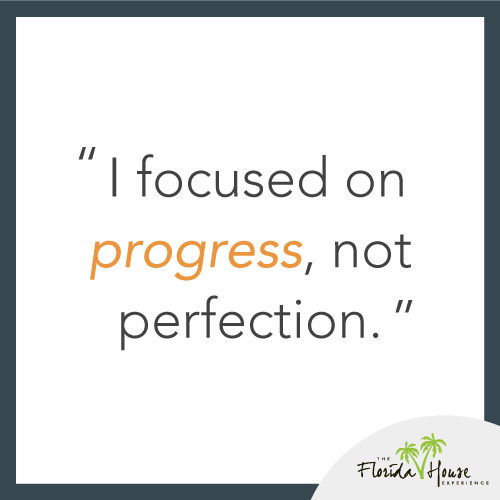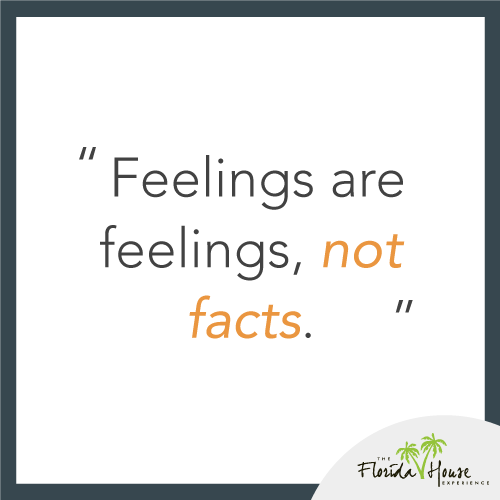
Whether we have been sober 3 years or 30 days, most would agree our sickness is propelled by negative thinking and behaviors. The common connection between all addicts is our fundamental inability to deal with emotions. Many addicts turn to drugs/alcohol in order to escape reality and shift our thinking. Once we escape the grips of addiction, for a brief moment, we experience a relief unlike any other. The misconception is that the individual is cured of their ailments. The disease of addiction is fatally progressive in nature. If an individual is suffering from a seemingly hopeless state of mind, it would be ignorant to assume the embedded thought process would escape overnight. Many of us find ourselves back on the merry-go-round… until one day the pain surpasses the fear of change.
Once we begin trudging down the road to recovery, we are forced to abandon ourselves entirely or remain enslaved to our old ways. I spent the first year of my sobriety priding myself on reaching the next monthly milestone without a drink or a drug. I continued to avoid any unwelcoming thought or feeling and ultimately the cycle continued. I propelled myself into allowing my past to dictate my future. I sought out chaos because it was all I had ever known. I continued to accept less than I deserved because I felt less than. In other words, I was completely sober from all substances but a prisoner to the critic in my head.
Most of us have been shackled to our unhealthy thinking and our actions continue to follow suit. So here we are – sober – and still struggling. The truth is, once our solution (drugs and alcohol) are removed we are left to our old devices. It wasn’t long before I came to realize that the concepts of acceptance, navigating through character defects, and emotional sobriety are difficult to walk through.
Acceptance
 For years I thought if the people in my life would conduct themselves the way I saw fit, things would go much smoother. Perhaps everyone else was not the problem, but I was. I spent many agonizing years trying to get everyone else to live up to my impossible standards. When all else failed, I rebelled against the world around me. Thus, I was always a victim of circumstance.
For years I thought if the people in my life would conduct themselves the way I saw fit, things would go much smoother. Perhaps everyone else was not the problem, but I was. I spent many agonizing years trying to get everyone else to live up to my impossible standards. When all else failed, I rebelled against the world around me. Thus, I was always a victim of circumstance.
Looking back at the last two years of my life and the lives of those that journey down the road of recovery, I see how much more pleasant the outcome is when I accept people, places, and things exactly as they are. Learning to practice acceptance in my daily affairs has only proven to be successful when it follows suit to surrender. At least once a day, I encounter a situation that doesn’t align with my plan of action. When I refuse to accept things as they are, chaos ensues. From the aggressive drivers on my commute to work to the unplanned cancer diagnosis of a family member, there’s an overwhelming weight and stress lifted when I accept the outcome of any and all circumstances looming over me.
Navigating through character defects
 “This is the step that separates the men from the boys.” When I first sat down, with my sponsor, and identified my character defects I was less than enthralled. Overwhelmed would be an understatement. I was a prideful perfectionist. I assumed looking at my defects meant I needed to ask for God to remove them and then I’d be cured. In other words, I was acting out on my character defects while overlooking my character defects.
“This is the step that separates the men from the boys.” When I first sat down, with my sponsor, and identified my character defects I was less than enthralled. Overwhelmed would be an understatement. I was a prideful perfectionist. I assumed looking at my defects meant I needed to ask for God to remove them and then I’d be cured. In other words, I was acting out on my character defects while overlooking my character defects.
Awareness is the first step. I wrote out my list of defects and sure enough, I realized just how imperfect I am. I also realized how unrealistic my expectations were. I was smacked in the face with more humility than I’d like to admit. Over time, I began seeing my defects cropping up on my nightly 10th step inventory and I felt defeated. The big book is very specific in regards to asking for God’s help with our character defects. I focused on progress, not perfection. The more willing I was to ask for God’s help, with my less than favorable defects, the more growth I began to experience. I continue to practice less criticism and more willingness when it comes to navigating through my character defects.
Emotional Sobriety
 Of all the lessons I’m learning in recovery, maintaining emotional sobriety has been the hardest. Getting sober, everyone suggested I stay out of a relationship for a year. I think I waited one year and three days (typical addict). That’s when life showed up and practical application came into play. At first, I struggled with engaging in genuine intimacy. I remember feeling empowered by my lack of response when my boyfriend would share his feelings for me. I would make an awkward self-degrading joke or laugh in hopes of avoiding any further conversation. Then came conflict, and I had that ever so familiar feeling of Ahhh, I have arrived. I would insist upon hours of confrontational interrogations and follow it with self-induced victimization. It was a hurricane of emotional disarray.
Of all the lessons I’m learning in recovery, maintaining emotional sobriety has been the hardest. Getting sober, everyone suggested I stay out of a relationship for a year. I think I waited one year and three days (typical addict). That’s when life showed up and practical application came into play. At first, I struggled with engaging in genuine intimacy. I remember feeling empowered by my lack of response when my boyfriend would share his feelings for me. I would make an awkward self-degrading joke or laugh in hopes of avoiding any further conversation. Then came conflict, and I had that ever so familiar feeling of Ahhh, I have arrived. I would insist upon hours of confrontational interrogations and follow it with self-induced victimization. It was a hurricane of emotional disarray.
As you can imagine, sobriety wrecked my plans to avoid real emotions and vulnerability. I have learned that my lack of emotional sobriety is sure to create utter misery. I’ve learned that my emotional instability is driven by a thousand forms of fear. Therapy has helped me walk through healing the traumas of my childhood. This has not been an overnight matter. In fact, I am still currently learning how to pause before reacting on solely on my emotions. My sponsor reminds me daily: “Feelings are feelings, not facts.” The more that I surround myself with women that practice these principles, the more I am able to apply their helpful methods. Chaos has become less and less appealing. I strive to become more aware of how, why, and when I am experiencing erratic emotions and I am learning how to regulate my reactions.
Sobriety is full of many mountains and valleys. Without the valleys, would I truly embrace the mountains? Experience has taught me that gratitude often disguises itself in adversity. Humility has become the foundation of experiencing true freedom from the bondage of self. Tapping into the darkest corners of my innermost self, I have begun to heal old wounds. From total destruction comes true rehabilitation. I am constantly facing two choices: Continue to live in pain until I drink/drug again or abandon myself to a new way of life. At times life is messy and unbearable. By the grace of God, I am still sober. The beauty of it all, there is always a solution.






